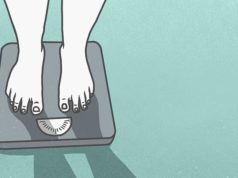1. Think slow and steady.
Take a look at the progress you've seen so far: "For weight loss, you should only be dropping half a pound to two pounds per week," says Kacie Vavrek, R.D., a dietitian at The Ohio State University Wexner Medical Center. Otherwise, you may need to adjust your calorie intake a bit (eat more if you're dropping pounds too quickly, or vice versa). You can use an all-inclusive tracking tool like the Nokia Body+ (which helps you monitor your weight and BMI) and Health Mate app (which helps you record your daily water and food intake) that work together so you can cross-reference how your diet may be affecting your weight over time.
Resist the urge to go all-out on your diet and exercise to see more significant changes on the scale. An extreme approach often leads to burnout, says Erin Risius, L.P.C., a healthy psychology expert and wellness counselor at Hilton Head Health. Remember: Consistency is key.
2. Forget the formal diet.
Even if you've seen initial success with a specific diet-say, the Whole30 or ketogenic diet-that doesn't mean it's going to work long term. In fact, most people who see success on a restrictive diet later gain back the weight they lost (and sometimes more) when they go off the diet, says Vavrek. Research backs this up: Although dieters typically lose 5 to 10 percent of their body weight in the first six months of a diet, between one-third and two-thirds of people regain more weight than they'd lost within the next four or five years, according to researchers from UCLA who analyzed 31 long-term studies. Since the diet likely isn't something you can handle doing on a long-term basis, your success won't be long term either. (The anti-diet is the healthiest diet you can be on.)
If you're on a diet right now, here's your game plan: Slowly start including small portions of foods you enjoy eating, whether that's slowly turning up your carbohydrate intake or adding a sweet treat each day until you're at a sustainable balance, says Vavrek.
"The key is to avoid the all-or-nothing mindset," says Risius. "When you're eating in a way that's nourishing, but doesn't feel depriving, and moving your body in a way that you enjoy and feels good, you can ditch the means-to-an-end mindset and shift toward a lifestyle mindset."
3. Tune in to non-scale victories.
"One of the reasons people lose motivation-even if they're making progress-is because they're impatient to reach the end goal," says Rusius. "Healthy weight loss is never as fast as we want it to be, so it's important to note all the positive shifts in our lives as we strive toward that goal."
Do you have more energy? Clearer skin? Are you feeling stronger? Acknowledging these non-scale victories helps remind you that health isn't all about an end goal, but about making a lifelong lifestyle change for the better.
Your plan: Try making mini non-scale goals for yourself that act as stepping stones to your main goal. Reward yourself (with anything other than food, says Vavrek) if you make it to the gym a certain number of times per week, ate your goal number of veggie servings per day, hit your water goal for the week, and so on. (Read more: Could a "Cyclical Mindset" Be the Secret to Achieving Your Goals?)
4. Mix it up.
As your body changes, so should your nutrition game plan. "As you lose weight, you'll need to adjust your calories," says Vavrek. When you're lighter, your body doesn't need as many calories for energy. For example, a moderately active 30-year-old woman who's 5 feet and 5 inches tall will burn about 120 calories more per day at 150 pounds than at 120 pounds, according to the Harris–Benedict formula (which calculates the basal metabolic rate, or calories burned at rest).
That's one reason it's important not to start out with too large a calorie deficit. As you lose weight, you'll need to decrease your intake, and if you're already running on E, that'll be difficult (if not impossible) to maintain.
Plus, existing on a calorie deficit and losing weight usually results in reduced muscle mass-which isn't great, because lean muscle burns calories and helps keep your metabolism high. All this means you'll eventually plateau, says Vavrek.
It's not hopeless. First, not all calories are created equal. Focus on meals with protein, healthy fats, and fibers, says Vavrek. Those nutrients take longer to digest, which can help keep you feeling full. If you're feeling excessively tired or hungry, those are signs you may need to increase your overall calorie intake, says Vavrek. To prevent more muscle mass loss, try eating smaller meals with protein more often and make sure to strength train on the regular, she says.
5. You can’t rely on just diet or just exercise.
That's right-another way to prevent muscle mass loss is by hitting the gym, and especially those heavy weights. (Start with this beginner's guide to lifting heavy.)
"A lot of people try to lose weight without exercise, but then you end up losing muscle mass and slowing down your metabolism," says Vavrek. Ditto with only hitting the gym, but leaving your diet alone: "If you're working out really hard but eating whatever you want, you're not in a calorie deficit and won't lose weight."
That's why research shows that people who are the most successful with weight management have the diet controlled, but stay active enough to maintain muscle mass and keep their metabolism high, she says.
6. Stop thinking of bad days as “bad.”
One day of treating yourself or celebrating isn't going to ruin your progress, says Vavrek: "Just don't let that one day turn into a whole week." And if it's not going to ruin your progress, it's not bad. It's just allowing yourself to enjoy life.
"If you're rooted in the all-or-nothing, perfectionistic mindset, you'll likely see a lapse as a reason to quit trying altogether," says Risius. "The process of behavior change is an ebb and flow, so when you hit a wall, simply re-evaluate your game plan and keep moving forward."
Maybe you need to take it down a few notches. (Remember: Doing something is always better than doing nothing.) Also gather support through friends, family, and/or professionals who can provide gentle accountability to help you get back on track. Part of maintaining healthy habits for life includes surrounding yourself with people who are on the same page.
"I really like the 80/20 rule," says Vavrek. "It means that if you can eat healthfully 80 percent of the time, you can allow yourself freedom with that 20 percent and still have foods you enjoy. It's something you can live with long after you've reached your goal."











